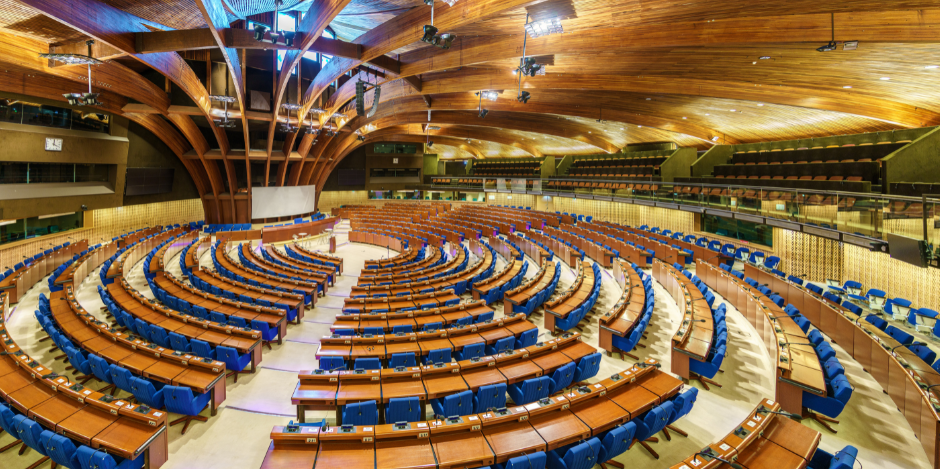CRTA Address at the session of the PACE monitoring committee
 Photo – Canva
Photo – Canva
Read the full speech of Rasa Nedeljkov, Crta’s Program Director and Chief of the Crta’s Election Observation Mission at the session of the PACE monitoring committee held on the 16 April 2024.
In recent months, Serbia has faced significant electoral challenges, casting shadows on the integrity and democratic nature of its elections. Last year, the late fall and early winter were marked by severe electoral fraud, arguably more appalling than ever before. Now, as we approach spring, cautious optimism emerges about the potential for reform and more democratic elections.
The initiation of dialogue by Ana Brnabic, the Speaker of Parliament and former Prime Minister, offers a glimmer of hope. Brnabic has called for the implementation of ODIHR recommendations, inviting participation from ruling and opposition parties, as well as representatives from the international community and civil sector.
However, the reality remains complex. Despite the passage of months since the events of December 17, the prosecutorial system continues to overlook the criminal activities within the electoral process, perpetuating a culture of impunity. This ongoing neglect occurs even as new elections for the Belgrade City Assembly are set for June 2, raising concerns about the sincerity and effectiveness of current reforms.
The challenges are multi-faceted: the blending of state functions with the interests of the dominant Serbian Progressive Party has led to a troubling conflation where state resources are used to support the party’s campaign. This includes misuses such as extraordinary state budget allocations in the amount of 425 million EUR and the involvement of state institutions in spreading defamatory content about the opposition, civil society, and critical media. Moreover, the overwhelming abuse of the presidential office confused the public, with many citizens mistakenly believing that President Vučić was a candidate in parliamentary elections and some even thinking that presidential elections were underway.
This confusion is exacerbated by inaccuracies and manipulations within the voter registry, which have sown further doubt about the legitimacy of the electoral outcomes. Extraordinary local elections in one-third of the country enabled voter migrations designed to enhance local results for the Serbian Progressive Party, dominantly in the capital Belgrade. These manipulations, often illegal, have jeopardized the equality of the elections and the constitutionally guaranteed right to local self-governance.
Media coverage, heavily biased in favor of the ruling party, has done little to alleviate these issues. The most influential media outlets have subjected citizens to extreme propaganda, further skewing the electoral landscape.
At a recent meeting convened by Speaker Brnabic, CRTA presented concerning data showing that approximately 400 voters were being removed daily from the Voter Register following the December elections. This rate of removal is significantly higher than the average daily changes recorded between 2022 and 2023. Identified abnormal changes were concentrated in a relatively small number of polling stations, suggesting targeted, non-systemic alterations to the Voter Register. The Ministry of Public Administration and Local Self-Governance, responsible for overseeing the Voter Register, offered no explanation for these anomalies. Instead, it accused CRTA of undermining Serbia during a challenging period and acting as a pawn of foreign interests.
Does this scenario reflect a democratic dialogue, or are we witnessing the continuation of practices that undermine the foundations of democracy in Serbia? The challenges ahead are daunting. The Joint Opinion of the Venice Commission and the OSCE/ODIHR on Serbia’s electoral framework calls for immediate action: preventing late amendments to electoral legislation, conducting thorough audits of the Voter Register, and increasing transparency.
While there is an opportunity for dialogue and reform, the path forward requires a concerted effort to address these deep-seated issues. The international community’s critique, including a recent scathing report from the United Nations Human Rights Committee, underscores the urgency of these reforms. This report criticizes Serbia’s failure to provide sufficient information regarding the actions taken by the prosecution and the Constitutional Court concerning documented criminal offenses related to last year’s elections—a severe breach of Serbia’s obligations. Serbia must demonstrate a genuine commitment to rectifying these issues, ensuring that future elections are free, fair, and truly reflective of the will of its citizens.
After all, but also above everything else, citizens of Serbia are entitled to demand free and fair elections. All CRTA efforts are intended NOT on an outcome in which one or another political party would have more or fewer seats in the parliament, a bigger or smaller share in the executive branch. No, we are trying to restore the sovereignty of citizens, for which democratic elections are a critical instrument. If the elections are designed and conducted in a fashion that makes it impossible for voters to bring about political change, then we, the citizens, are no longer political subjects; we are no longer the citizens who decide what government to employ in our service. Instead, we are just serving the interests detached from our legal system, institutions, and Constitution.








